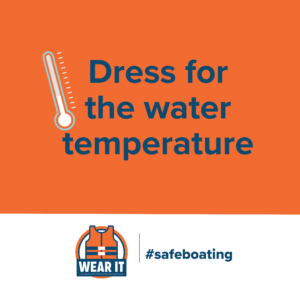Boating in cold weather offers a unique and peaceful experience, whether you’re fishing, wildlife watching, hunting, or just enjoying the crisp winter air. However, it also brings added risks that require extra preparation, caution, and attention to detail. Use these essential tips to ensure your cold weather boating trips are safe and enjoyable.
- Dress for the Immersion: Cold weather demands proper attire. Dress for the water temperature, not the air temperature; always be prepared for immersion. Wear layers of moisture-wicking, insulating, and waterproof clothing to stay warm and dry. Don’t forget a hat and gloves; and consider a float coat or survival suit for added safety.
- Wear Your Life Jacket: This is your most vital boating gear! Always wear a U.S. Coast Guard approved properly fitted life jacket, even if you’re an experienced boater. Hypothermia can set in quickly if you fall into cold water, and a life jacket can keep you afloat while you wait for help. Life jackets should be worn over your outer layer, never underneath. It’s important to make sure it still fits properly after dressing in layers.
- Check the Weather: Winter weather can change quickly. Check forecasts before heading out and monitor the conditions during your trip. Be prepared to cut your outing short if the weather turns. Resources like weather apps can be valuable to help you stay up to date with the forecast during your outing.
- Prepare Your Boat: Inspect your boat thoroughly before commuting to the water and again before launching. Make sure to include your trailer in routine maintenance if you’re towing a boat to the water. Ensure your engine, fuel system, and batteries are in good working condition, as cold weather can make mechanical issues worse. Have de-icing tools on hand for frosty surfaces.
- Carry Extra Safety Gear: Equip your boat with a cold-weather emergency kit, including:
- Flares and a waterproof flashlight
- Extra blankets and dry clothes
- Hot drinks in a thermos
- A VHF radio and fully charged cell phone
- Avoid Overloading Your Boat: Weight distribution is especially important in cold conditions to prevent capsizing. Keep gear organized and avoid overloading. If you are hunting, or fishing, think about where you are storing your gear while underway. Make sure to always follow the weight limitations set for your vessel by the U.S. Coast Guard. The weight limitations should be visible on an orange placard near the drivers console or engine compartments.
- Know the Risks of Cold Water Immersion: Falling into cold water can lead to hypothermia in minutes. Familiarize yourself with the 1-10-1 principle:
- 1 minute to control your breathing.
- 10 minutes of meaningful movement before you lose muscle function.
- 1 hour before unconsciousness due to hypothermia.
- Share Your Float Plan: Tell someone onshore where you’re going, your route, and when you plan to return. Filing a float plan can be as simple as texting your plans to a family member, or friend with trip details and launching locations: what time you are launching, what time to expect your return, and the location you are boating. If you are not responding within an hour of your expected return, emergency services should be alerted There are several boating apps that have float plan templates you can send directly to emergency contacts. This is especially critical in cold weather, as delays can be life-threatening.
Enjoy the Beauty, Respect the Risks
Cold-weather boating can be a magical experience, but it requires extra preparation and vigilance. By following these tips, you can enjoy the tranquility of winter waters while staying safe. For more safe boating advice, visit SafeBoatingCampaign.com.
Stay warm, stay safe, and happy boating!






